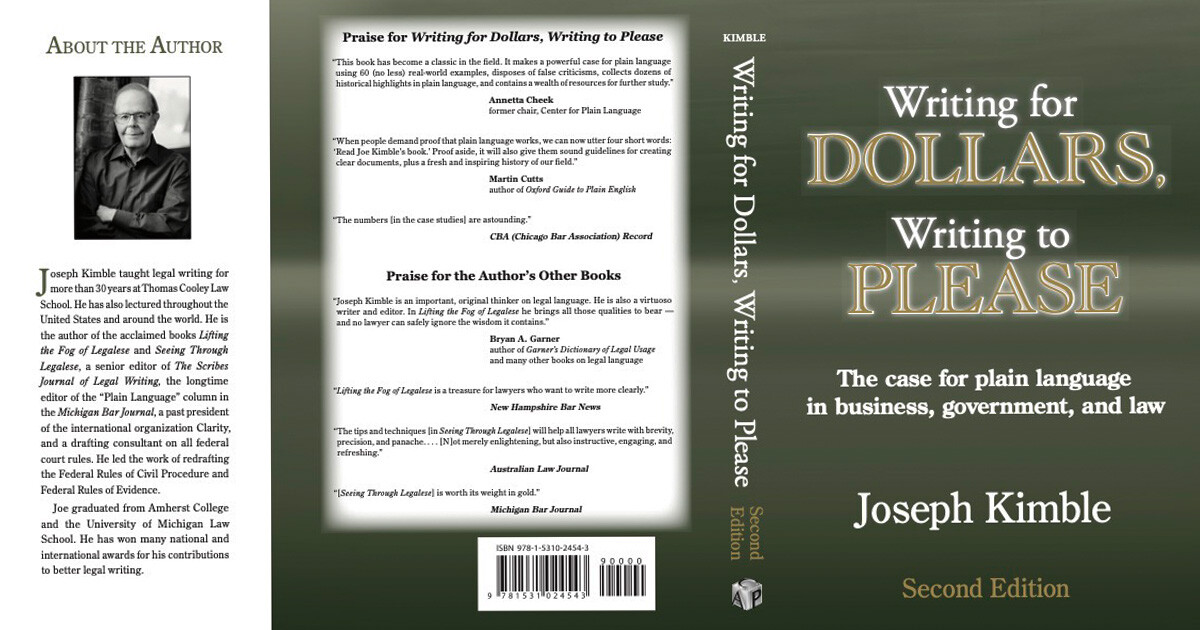What is the great hidden cost of doing business and carrying on the government? Poor communication. And the numbers are staggering. Anyone who needs proof can find it in the just-published second edition of Writing for Dollars, Writing to Please: The Case for Plain Language in Business, Government, and Law, by Joseph Kimble, a distinguished professor emeritus at Cooley Law School. He has been collecting data for decades.

One chapter in the book summarizes 60 empirical studies showing the benefits of using plain language for both sides—agencies and companies on the one hand, and consumers on the other. Here are just a handful of examples:
- The Veterans Benefits Administration revised a single letter and tested it at a regional office. From one year to the next, phone calls dropped from about 1,110 to about 200. That’s one letter alone at a single agency.
- In the State of Washington, the Department of Revenue rewrote a letter that tripled the number of businesses paying a commonly ignored use tax.
- After simplifying a billing statement, the Cleveland Clinic recovered an additional $1 million a month in the months following, thanks to an 80 percent increase in patient payments.
- Researchers gave persons taking out payday loans two different envelopes containing their loan: for one group, the envelope was blank; for the other group, the envelope had graphics that either compared the cost of the loan over months with credit-card fees or illustrated how long, on average, people take to repay the loan. The envelopes with graphics decreased borrowing by 17 percent. When applied to the total amount that Americans borrowed in that year, this represents an $8.5 billion decrease.
- In Canada, the Digital Transformation Office worked with different agencies to improve website design and content. In prototype testing, the user success jumped from 40 to 85 percent in one instance, from 23 to 68 percent in another, and from 23 to 72 percent in another.
The studies were done in countries around the world. Besides Canada, that includes the U.K., Ireland, Portugal, Norway, Sweden, Hungary, South Africa, Portugal, Australia, and New Zealand.
“Again, the gains from plain language tend to be reciprocal: what benefits government or a business very often benefits consumers as well,” said Kimble. “If, for instance, a letter or a website is decently clear so that fewer people make mistakes or need to call the phone center, then both sides win. And besides the quantifiable benefits demonstrated in the studies, think of the unquantifiable costs — the frustration, anxiety, anger, and ill-will created when the public cannot understand what they’re being asked to do, or what their rights are, or what steps they need to take to claim a benefit. In the case of medical information, poor communication can lead to disastrous results.”
The main goal of plain language is to make online and written information clear and accessible to the greatest possible number of its users. This takes great skill and draws on dozens of principles and techniques, ranging over organization, design (or layout), sentences, words, and testing documents on ordinary readers whenever possible. One chapter of the books lists the elements of plain language. Another one addresses the ten biggest myths about plain language (for instance, it reduces writing to baby talk, it’s subverted by the need to use technical terms, it’s not accurate or precise).
“The evidence is undeniable: readers (including even judges and lawyers) strongly prefer plain language in public and legal documents, they understand it better than bureaucratic and legalistic style, they find it faster and easier to use, they are more likely to comply with it, and they are much more likely to read it in the first place,” said Kimble. ”And because of all that, plain language—in its full scope—can save all kinds of organizations untold amounts of money. If they would only invest in plain-language programs, the investment would repay itself many times over. They would improve the public’s perception of them. And they would make life easier for everyone.”